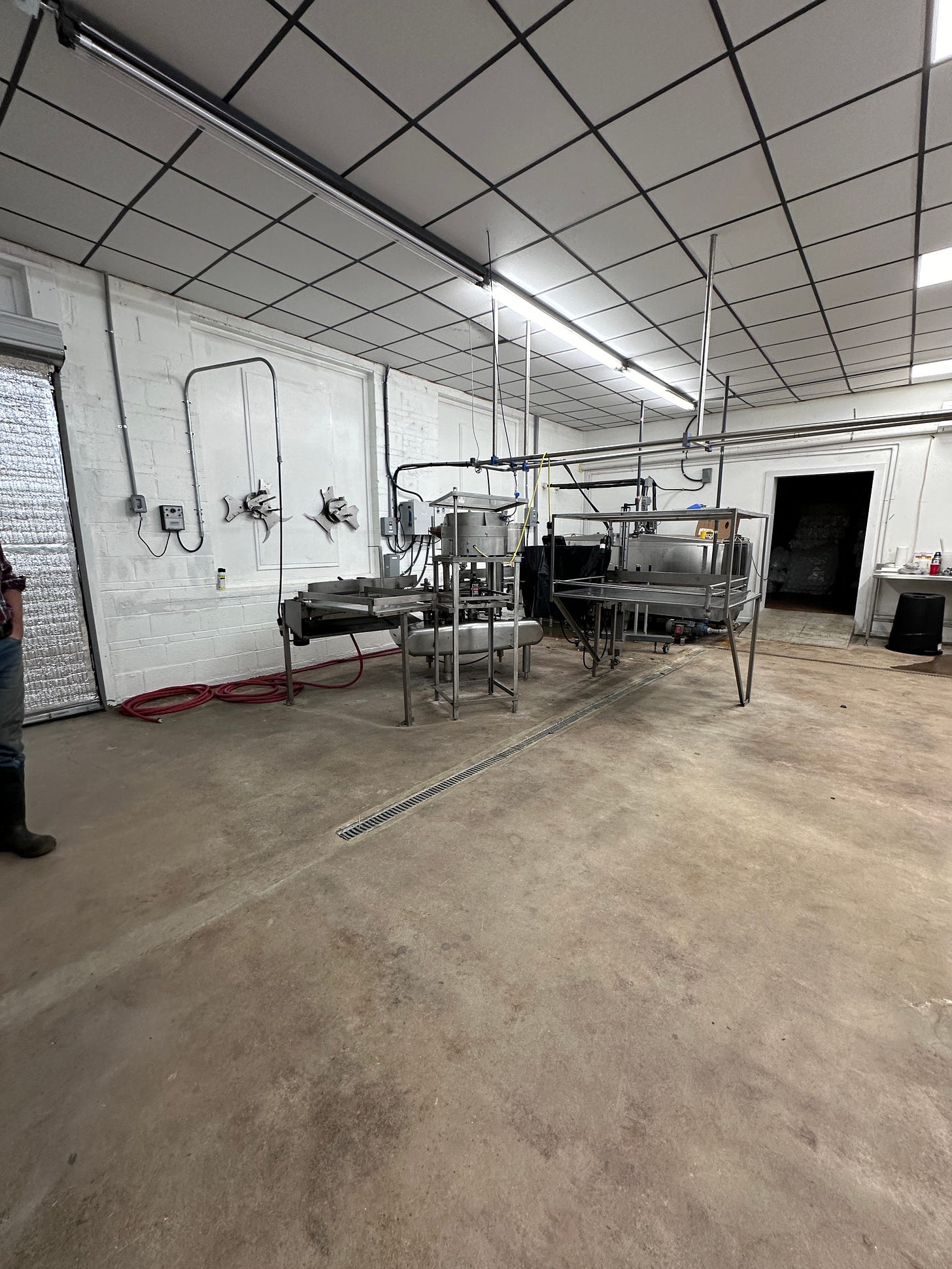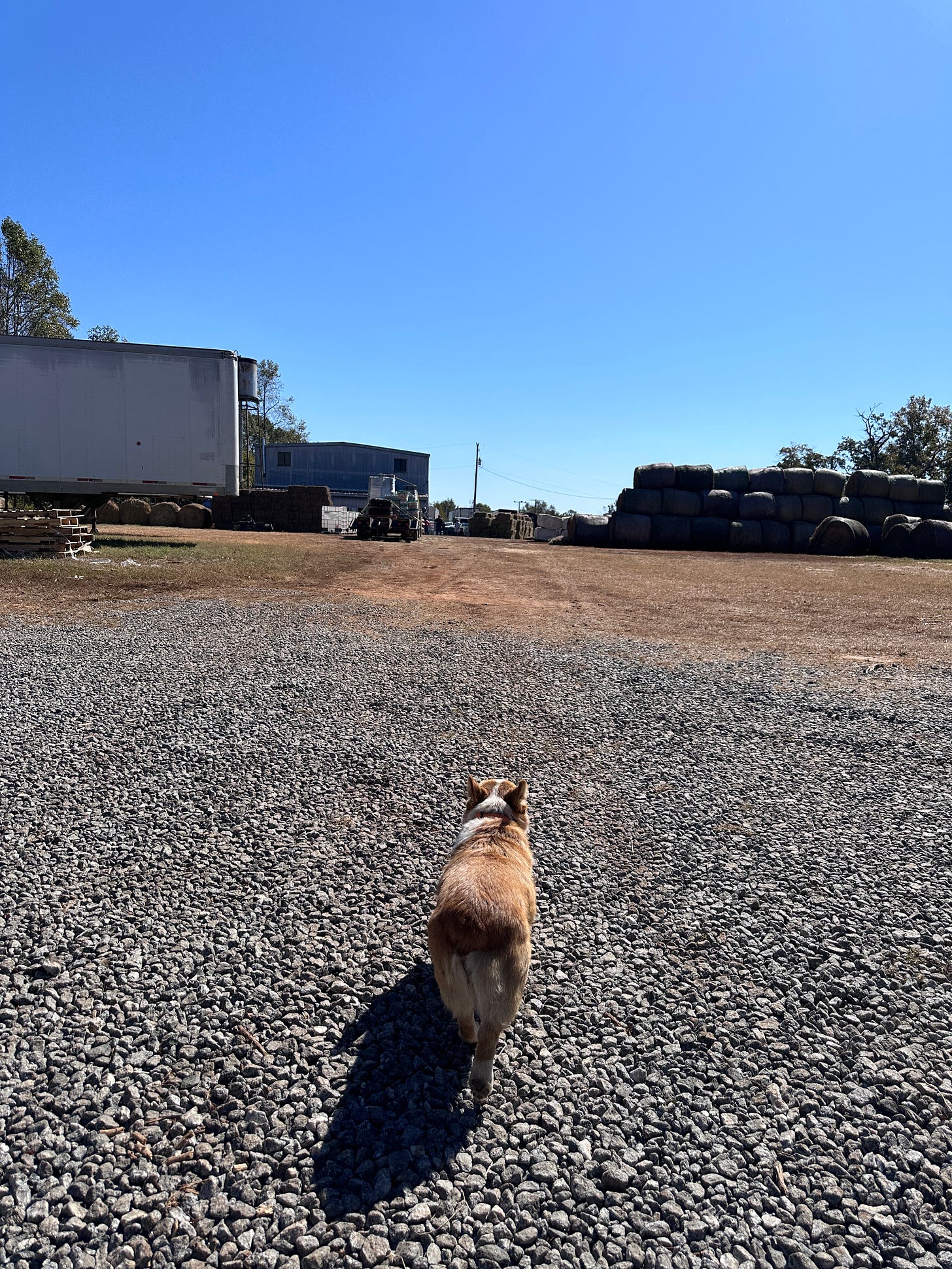Observations In Absurdity
In the wake of Helene, Overmountain Vineyards has mobilized with Big Bottom Milk Company around regular hours, mid-harvest.
In my 20s, I did a decent amount of acid. And I would always say, if you want to know how hard you’re tripping, go to the bathroom. The bathroom is unwaveringly normal, the control to your variable.
I’m reminded of this on a Monday morning, about 9 am, as I’m flipping through the news, organizing wine industry stories that broke over the weekend. Over the last three weeks, I’ve had a really difficult time focusing on my job, of which this is one. Work has become my bathroom on an acid trip. Everything is normal but it looks astoundingly warped, and that says everything I need to know about my current state of mind—and like an acid trip, the impressions of this won’t fade when the drug wears off. You can’t unsee this.
It’s only in these moments that I acknowledge that this event has affected me, someone who has potable water. I first noticed it on day three or four, after a phone interview about the hurricane with a winemaker just south of me. After hanging up, I had to shift gears to write a blog for a client called Dog-Friendly Wineries: Tips For Making The Most Out Of Your Visit. It was almost impossible for me to write.
I thought of my acid-measuring test again yesterday, standing in the creamery at Big Bottom Milk Company, talking to co-owners Stuart Beam and Preston Green, along with Overmountain Vineyards winemaker Sofia Lilly. They are the trio that formed when Lilly regained cell service and called Beam to check on him. “I didn’t even ask him about his corn,” Lilly said, as Beam laughed softly, “because I knew it was trashed.” What she did ask was: what can we do? Beam and Green had a dairy bottling line that they could convert into a water bottling line, “but it’ll cost money”. “I told him, start bottling, I’ll raise the money,” Lilly told me. “Within twelve hours we had $18k raised. That covered our first week."
Six days into fundraising, they had delivered 78 pallets of water to over 21 different locations and connected with a local pilot to get supplies to Elizabethton, Tennessee. All of this they did around normal operating hours: Preston and Green running milk during the day and water at night, and Lilly carrying on her harvest with a generator. “I had all my open-top fermenters sitting in the winery when I lost power,” Lilly told me, “so you go from keeping your wine at 60° to it slowly climbing.”
You can support the ongoing efforts of Big Bottom Milk Company and Overmountain Vineyards by donating to their relief fund.
Since then, they’ve delivered everything from sugar for beekeepers to Buddy heaters for people still without power. Having watched them work via social media for three weeks, I was stunned, upon walking into the creamery, by how much bigger I had imagined their bottling line to be. It sunk in just how hard these three have been working.
“I wake up every morning trying to figure out who I forgot about last night,” Beam told me before handing me a bottle of (amazing) chocolate milk. “You say, we’re going to get you some help,” he said. “And they want you to help their neighbor instead, and so you say I’m gonna help you and your neighbor.” Beam, who still sees a major need for knocking on doors in farming communities, quickly learned that if you don’t remember who needs what, they won’t come to remind you. “They don’t want to take help from anybody else.”
Driving down here, I became increasingly aware that I was, for the first time, interviewing people in the middle of a traumatic event. After almost blowing through a stop sign because I thought I saw a body on the banks of the French Broad, I realized that the interviewer, too, was in the middle of a traumatic event. Neither Beam, Green, nor Lilly have stopped to personally process this. Their family is here. They were out in this storm too—Green milking cows as the roof of a nearby barn blew off, and Beam driving to him with a tractor, stopping along the way to pull cars out of ditches. “After that, it was constant work,” Beam said.
From left: Stuart Beam, Sofia Lilly, Preston Green
“We can’t afford to stop,” Lilly told me. As time passes and we move further away from the initial impact, it seems that the need for support is only widening. In his article in The Guardian, Chris Smith gave us a sense of the scope of the devastation that farmers will face as they test their water-logged soil for pathogens, chemicals, and heavy metals, writing, “How do farmers ‘clean’ our fields? How does chemical-soaked soil grow anything again, let alone food?” As of right now, it looks like residents of Mitchell County, home to the highest point east of the Mississippi, could be without water for years after having their water treatment system and sewer plant completely gone. In the words of Senator Ralph Hise, “it does not exist, and it’s unsalvagable”.
“I think the scariest thing is, what happens in a week, two weeks, a month,” Green said. “The fallout that a storm like this has on rural area like Western North Carolina, Tennessee, Georgia, and upstate South Carolina—where people still don’t have power—I mean, I go to sleep at night thinking about it and I wake up thinking about it. The people doing it are volunteers like us. How long can they handle it?”
You can support the ongoing efforts of Big Bottom Milk Company and Overmountain Vineyards by donating to their relief fund.
I still feel like I’m climbing out from underneath this, intellectually. Each time I get to proverbial higher ground to look around at the scope of what has happened, I see how the reach of this crisis extends further and further. It was during my visit to the creamery that I learned of the Elk Fire in Wyoming, which began the same day that Helene hit—almost a month ago.
Had I not had a growing friend in writer Farrah Berrou, it may have been longer than a week ago that I learned that Israel had begun civilian-targeted strikes on Lebanon that same week. Over the next month, Farrah and I will exchange letters, a project we’ve been planning for months, and which today feels more emotionally charged than I ever could have anticipated. Keep an eye out for her first letter over at Aanab News.
I’ll also continue checking on the recovery and impact on my immediate wine community, for wine is everything, and everything is wine.
The greeter at Big Bottom Milk Company escorting me to my interview—whenever I meet a corgi, I take pictures for my dad, in honor of our late family dog, Tilly. Hi dad.









❤️❤️❤️🙌🙌🙌
Deep cut story of people coming together in this bizarre time for all of us in WNC. Intriguing to read about it through your lens.